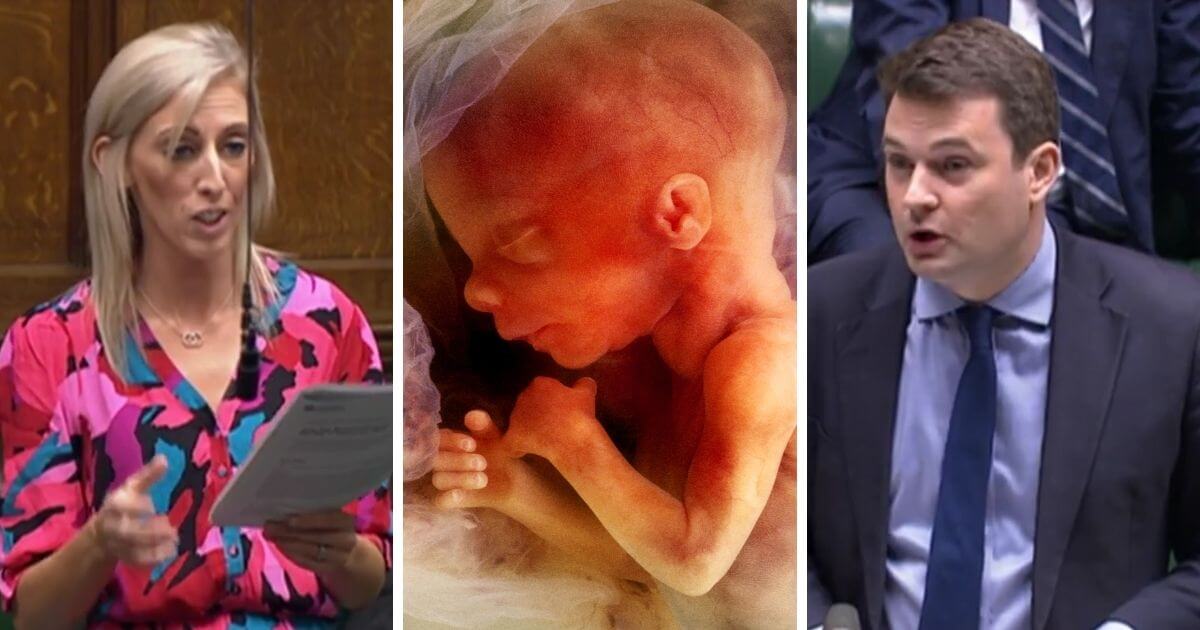New regulations from the Government in Westminster that would force schools in Northern Ireland to teach secondary school pupils about abortion would “normalise” abortion and “diminish the value of life”, according to MPs critical of the plans.
Yesterday, as part of an ongoing debate about the teaching of Relationships and Sexuality Education (RSE) in Northern Ireland, which includes teaching about abortion, a number of MPs objected to the teaching of this highly controversial topic and sought assurance from the Government that parents would retain the right to remove their children from such lessons.
DUP MP for Upper Bann, Carla Lockhart, who is Chair of the All Party Parliamentary Pro-Life Group, argued that, despite Government claims, abortion cannot be taught in a “morally neutral” way.
“The very act of teaching about abortion… normalises it, presenting the subject—the taking of innocent human lives at their most vulnerable stage—as a mere moral dilemma about which people may be free to disagree, whereas for those who are pro-life, human lives are at stake”, she said.
“Further, it diminishes the value of life because if young people are taught about the legal availability of abortion and how to access it, they are more likely to do so in greater numbers”.
Lockhart also took aim at the Secretary of State’s assurance that teaching about abortion would be scientifically accurate. “[M]any people in Northern Ireland and many scientists would contend that an unborn baby is, scientifically, a human being” she said, and claims to the contrary as found in some RSE resources already in use in England and Wales are “neither neutral nor scientific”.
Along with Miriam Cates MP, Lockhart insisted that “these are matters which should be left to parents, not schools” and that parents are the “first educators” of their own children.
Speaking on behalf of the Government, Assistant Whip Robert Largan said “It is the Government’s view that educating adolescents on issues such as… access to abortion should be done in a factual way that does not advocate or oppose a particular view on the moral and ethical considerations of abortion…”.
He further insisted that the Government is required to introduce these regulations due to the passing of the Northern Ireland (Executive Formation) Act.
The Education Department in Northern Ireland is currently carrying out a consultation on the right of parents to withdraw their children from this content in schools.
A number of other MPs including Robin Millar, Fiona Bruce, Sammy Wilson and Ian Paisley also raised concerns about the new regulations during the debate.
Girls could be taught how to get an abortion without parental knowledge
The Secretary of State for Northern Ireland, Chris Heaton-Harris, has claimed that the regulations will “mirror the approach taken in England”. If this is the case, it is highly controversial to force Northern Ireland schools to teach children about abortion given what is currently being taught regarding abortion in the RSE curriculum in England.
England’s RSE guidance states that there are “many excellent resources available, free of charge, which schools can draw on”, specifically listing the Sexwise website as a resource for “up to date information on all aspects of sexual and reproductive health…which teachers may find helpful for their knowledge”.
The Sexwise resource outlines how to get an abortion (including late-term abortions) and teaches girls how to go about secretly having an abortion without their parents knowing.
In the same resource, students who are pregnant are encouraged to book an appointment at an abortion clinic, even if they are unsure about whether they want to have an abortion. The resource states that “Abortion is safer the earlier it takes place, so even if you’re not certain about your decision, it’s a good idea to get a referral. You’ll always be given time to make up your mind, if you need it”.
Contact details for the three largest abortion providers in the UK, all of whom received the majority of their income from performing abortions, are provided in the resource.
This includes MSI Reproductive Choices (formerly Marie Stopes), which the Care Quality Commission accused of paying staff bonuses for encouraging women to undergo terminations. At all 70 Marie Stopes clinics, inspectors also found evidence of a policy that saw staff utilise a high-pressure sales tactic, calling women who had decided against having an abortion to offer them another appointment. The report also stated that parents, partners or friends of pregnant women who might persuade them to think again about the termination were “seen as an inconvenience” and that “their presence was strongly discouraged”.
Extensive misinformation being taught in schools
An RSE Hub developed “to strengthen the quality and consistency of RSE in the South West and nationally” recommends teachers use resources provided by Education for Choice.
Its resources are highly biased and include extensive misinformation, for example, they state that “before the limit of viability (24 weeks in the UK), the foetus is not considered a human being.”
To state that an unborn child under 24 weeks is not considered a human being is simply an opinion and should be labelled as such.
The latest guidance from the British Association of Perinatal Medicine enables doctors to intervene to save premature babies from 22 weeks.
In the “Why do some people oppose abortion?” section of the resource, the EFC states “… if a fertilised cell is a human being, then using a condom or masturbating is tantamount to murder… as trillions of potential lives die in teenage boys’ bellybuttons every day”.
This misinformation falsely claims that those opposed to abortion believe that gametes, unfertilised sperm and eggs, require the same protection in law that an embryo or fetus should have.
Right To Life UK spokesperson, Catherine Robinson, said “Carla Lockhart and the other MPs should be commended for their continual and courageous pushback against regulations that run counter to devolution and attempt to push highly controversial issues on children in Northern Ireland. Lockhart is absolutely right that there is no way to present abortion to children in a morally neutral manner whilst simultaneously teaching children about how it works and how to access it”.
“The very fact of teaching children about access to abortion itself implies that abortion, the ending of the life of an unborn child, is morally acceptable. But this is precisely what is in dispute.”











